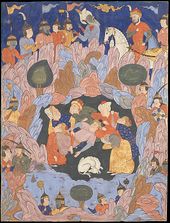Template:Pictorial-Islam-options: Difference between revisions
| [checked revision] | [checked revision] |
mNo edit summary |
mNo edit summary |
||
| Line 1: | Line 1: | ||
<noinclude>Also see: [[Template:Pictorial-Islam]]</noinclude><!-- HELP NOTES: Each option tag handles one random story --><choose> | <noinclude>Also see: [[Template:Pictorial-Islam]]</noinclude><!-- HELP NOTES: Each option tag handles one random story --><choose> | ||
<option weight="1">{{Pictorial-Islam|1=Qur'an Describes Altitude Sickness|2=[[File:Man in high altitudes.jpg|245px|link=Quran Describes Altitude Sickness]]|3=This article analyzes the apologetic claim that the Qur'an's description of altitude sickness is somehow miraculous, scientifically accurate, or prophetic. | |||
If the verse is taken figuratively, then it is not miraculous, since it is describing a phenomenon that would have been well-known to the wandering Arab nomads long before the revelation of the Qur'an. | |||
If the verse is taken literally, then it is scientifically inaccurate. There is no “tightening” of the chest. The constrictive sensation experienced at high altitudes is simply a result of having less air to breathe into your lungs, in addition to the gas already there actually expanding. ([[Quran Describes Altitude Sickness|''read more'']])}}</option> | |||
Revision as of 22:37, 4 February 2014
Also see: Template:Pictorial-Islam
|
